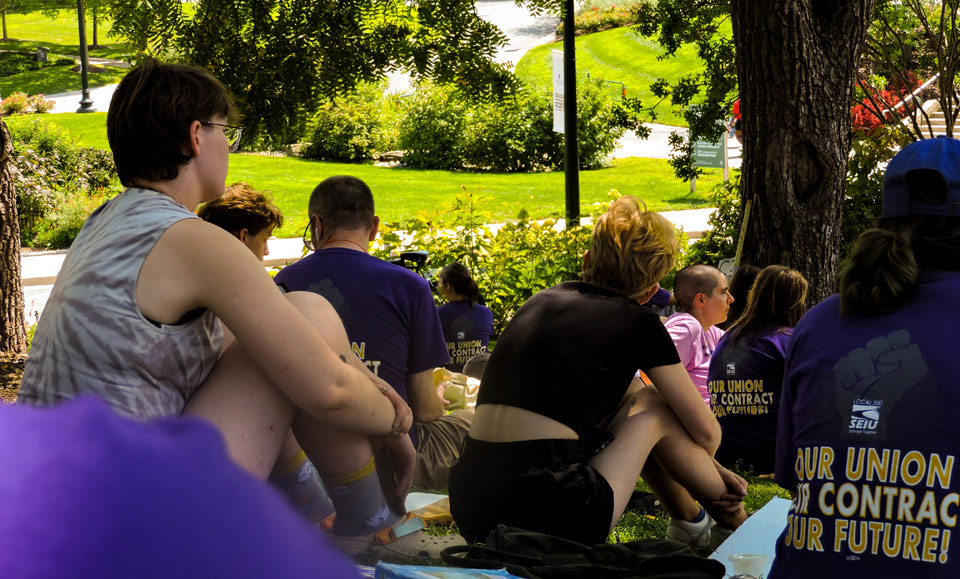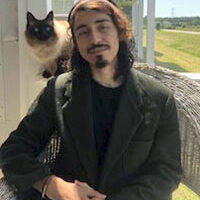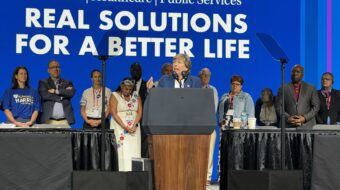
From Monday, August 22nd to Friday, August 26, the American University Staff Union, which represents around 550 clerical, technical, and academic staff, went on strike following the failure of the administration to negotiate a fair contract. Staff in this bargaining unit unionized in 2020, but they have worked without a union contract since then. President Sylvia Burwell of American University, who began her career at the infamous McKinsey & Company, makes just under $1.2 million while staff and adjunct faculty are forced to work multiple jobs to make ends meet.
Prior to last week’s strike, the Union asked for pay raises, expanded healthcare coverage, and better working conditions in a new contract, but the AU administration would not budge on their early offers. As union efforts escalated, on April 8, 2022, students, staff, grad workers, and other faculty protested an AU fundraising event at the Kennedy Center. AU’s “Change Can’t Wait” fundraising campaign has raised $342,000,000 to date, yet until the new Union-won contract, they chose not to allocate such funds to their staff.
During the week-long strike, staff, adjuncts, students, and community members told countless stories about the lack of respect AU administration has shown them leading up to the strike. Chants of “What’s disgusting? Union Busting!” could be heard from the freshman dorms as students moved in for the beginning of the semester. During a takeover of the student life building on campus, the Mary Graydon Center, one staff member said that she, “cannot afford to eat on my salary,” to which a packed crowd booed in response. A first-year student commented that he supported the strike: “I have only been an AU student for [a few days] but I already stand with the union.”
On Friday, the 26th, the week-long strike culminated in over half of the first-year class walking out of their convocation as University President Burwell took the stage to give her opening remarks. Videos of the spontaneous walk-out show a student standing up to yell “Pay your staff!” Within seconds, an estimated 1,000 first-year students stood up and left Bender Arena to join their colleagues on the picket line. As students came outside, strikers greeted them with open arms and pure emotion, as some union members began to cry at the unplanned show of solidarity.
One student activist representing the Claudia Jones Club AU, a student club connected to the Claudia Jones School for Political Education, said “I have never felt more of a sense of community at AU than I have felt while organizing with the Union. This is a huge win for workers on this campus and as students, we must carry this momentum onwards to organize in pursuit of better conditions on this campus for everyone, students and staff alike.”
The union, which is organized with SEIU Local 500, celebrated a new contract on Friday the 26th. Roshan Abraham, a first-year advisor and union member, was enthusiastic about the win saying, “Today’s outcome is a tremendous victory for all of us who took the risk out on the picket line… I am proud to have stood arm-in-arm with my colleagues over the past few days. The gains we have made through the agreement are life-changing.”
This new contract, achieved with the solidarity efforts of new and returning students, proves the importance of union solidarity in a pivotal moment when union organization is on the rise. The well-being of American University faculty and staff directly impacts the education of their students. Not only is the university a major employer of AU alumni, it’s impossible to be a good educator in a system where you’re overworked, underpaid, and where the turnover rate is high. This success, achieved with the help of students, has proven to be an educational experience in how to fight back against union busting.












Comments